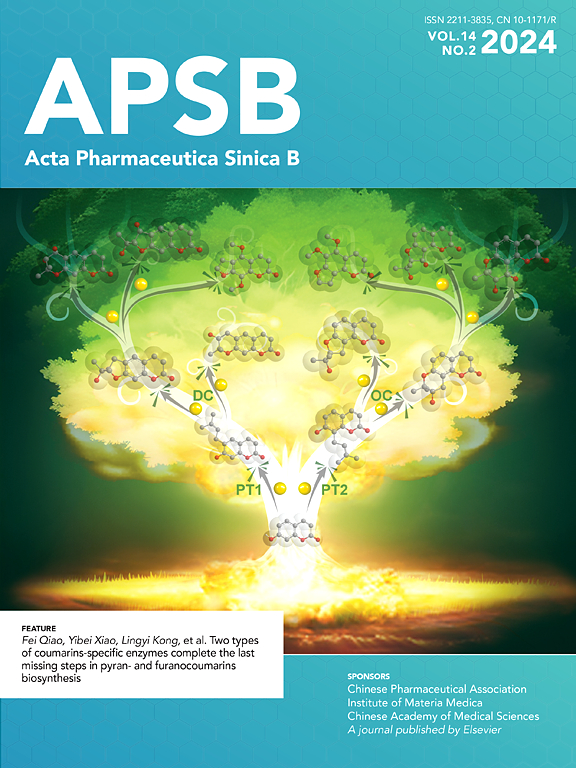毛蕊花苷通过靶向PCBP2改善肝细胞铁下垂和肝缺血再灌注损伤
IF 14.7
1区 医学
Q1 PHARMACOLOGY & PHARMACY
引用次数: 0
摘要
肝缺血再灌注损伤(HIRI)被认为是肝移植不可避免的过程。肝细胞铁下垂是HIRI发展的关键因素,但确切的机制和潜在的治疗方法尚不清楚。在这里,我们证明了肝细胞铁凋亡与聚(rC)结合蛋白(PCBP2)的下调之间存在很强的相关性,这损害了反向转运系统Xc -(由SL3A2/SLC7A11组成)的稳定性。此外,抑制PCBP2有助于促进辅因子p300增强HIF1α的转录活性,导致HMGB1的表达和分泌。然后,从高铁性肝细胞释放HMGB1使HIRI期间M1巨噬细胞募集和免疫反应恶化。此外,acta还能帮助PCBP2稳定Slc3a2和Slc7a11 mRNA的稳定性,并增强PCBP2系统Xc -的结合亲和力。除此之外,ACT还支持PCBP2通过限制p300和HIF1α来限制hmgb1诱导的M1巨噬细胞募集。此外,肝细胞特异性敲低PCBP2直接干预ACT对HIRI小鼠的治疗效果。综上所述,ACT通过促进PCBP2维持系统Xc -的稳定性和限制HIF1α/ p300-HMGB1信号传导来减轻肝细胞铁沉和HIRI。这些发现突出了ACT治疗HIRI的疗效,并为创新治疗策略提供了见解。本文章由计算机程序翻译,如有差异,请以英文原文为准。

Acteoside ameliorates hepatocyte ferroptosis and hepatic ischemia-reperfusion injury via targeting PCBP2
Hepatic ischemia-reperfusion injury (HIRI) has been considered as an inevitable process of liver transplantation. Hepatocyte ferroptosis is a key factor in HIRI development, yet precise mechanism and potential therapies are still unclear. Here, we demonstrated a strong correlation between hepatocyte ferroptosis and the downregulation of poly(rC)-binding protein (PCBP2), which compromised the stability of antiporter system Xc– (consisted of SL3A2/SLC7A11). Besides, inhibiting PCBP2 contributed to facilitating cofactor p300 to enhance the transcriptional activity of HIF1α, leading to the expression and secretion of HMGB1. Then, released HMGB1 from ferroptotic hepatocytes worsened M1 macrophage recruitment and immune response during HIRI. Additionally, acteoside (ACT) was shown to assist PCBP2 in stabilizing the mRNA stability of Slc3a2 and Slc7a11, as well as enhance the binding affinity of PCBP2–system Xc–. Beyond that, ACT also supported PCBP2 to limit HMGB1-induced M1 macrophage recruitment through imposing restrictions on p300 and HIF1α. Furthermore, specific knockdown of PCBP2 in hepatocytes directly interposed the therapeutic efficacy of ACT on HIRI mice. In conclusion, ACT alleviated hepatocyte ferroptosis and HIRI via promoting PCBP2 to maintain the stability of system Xc– and limit HIF1α/p300–HMGB1 signaling. These findings highlight the therapeutic benefits of ACT in treating HIRI and offer insights into innovative therapeutic strategies.
求助全文
通过发布文献求助,成功后即可免费获取论文全文。
去求助
来源期刊

Acta Pharmaceutica Sinica. B
Pharmacology, Toxicology and Pharmaceutics-General Pharmacology, Toxicology and Pharmaceutics
CiteScore
22.40
自引率
5.50%
发文量
1051
审稿时长
19 weeks
期刊介绍:
The Journal of the Institute of Materia Medica, Chinese Academy of Medical Sciences, and the Chinese Pharmaceutical Association oversees the peer review process for Acta Pharmaceutica Sinica. B (APSB).
Published monthly in English, APSB is dedicated to disseminating significant original research articles, rapid communications, and high-quality reviews that highlight recent advances across various pharmaceutical sciences domains. These encompass pharmacology, pharmaceutics, medicinal chemistry, natural products, pharmacognosy, pharmaceutical analysis, and pharmacokinetics.
A part of the Acta Pharmaceutica Sinica series, established in 1953 and indexed in prominent databases like Chemical Abstracts, Index Medicus, SciFinder Scholar, Biological Abstracts, International Pharmaceutical Abstracts, Cambridge Scientific Abstracts, and Current Bibliography on Science and Technology, APSB is sponsored by the Institute of Materia Medica, Chinese Academy of Medical Sciences, and the Chinese Pharmaceutical Association. Its production and hosting are facilitated by Elsevier B.V. This collaborative effort ensures APSB's commitment to delivering valuable contributions to the pharmaceutical sciences community.
 求助内容:
求助内容: 应助结果提醒方式:
应助结果提醒方式:


